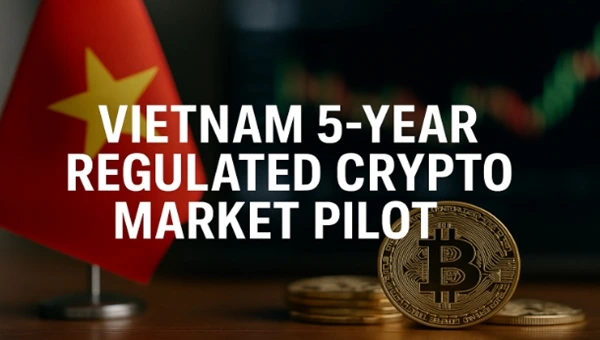

From Unregulated Boom to Regulatory Reset
The country’s relationship with crypto is rooted in necessity as much as innovation. Ranked fourth globally on Chainalysis’ 2025 index, adoption surged when traditional banking faltered under inflation and scarce lending. Entrepreneurs and younger workers gravitated toward digital assets, pushing trading volumes to $100 billion last year.
Yet the bulk of that movement flowed through unregulated exchanges like Binance and Bybit, sidestepping taxes while heightening exposure to scams and market swings.
Earlier interventions, notably the ICO ban of 2018, proved counterproductive, strengthening informal networks. The Digital Technology Industry law, active since June, marks a fresh attempt to balance oversight with growth.

Vietnam’s High-Bar Licensing Framework
Vietnam just laid down its crypto rulebook. Resolution 05, passed on September 9, kicks in by January 2026. The Finance Ministry will start handing out licenses, but with strict conditions: every trade must be done in dong, and only local companies. LLCs or joint stock companies can issue tokens.
Those tokens also need to be tied to something solid, like property or commodities. Securities and fiat are off-limits. Foreign investors can get in, but only through these licensed firms.
Local holders have a six-month grace period to move funds before unlicensed trading becomes a crime. The State Bank will enforce it all through NDAChain, giving regulators a clear view of money flows.
Vietnam’s licensing framework deliberately raises the bar for market entry, reflecting lessons from the collapse of FTX in 2022. Firms must secure 10 trillion dong, about $380 million, in charter capital, with 65 percent sourced from profitable banks, insurers, or securities companies.
The foreign ownership cap of 49 percent underscores a preference for domestic control. Leadership standards are equally demanding: CEOs require two years in the financial industry, CTOs need five years in technology, and each team must include at least 10 degree-holding specialists.
Anti-money laundering and know-your-customer rules form the pilot’s guardrails, mandating identity verification for all users and real-time reporting to regulators. The NDAChain platform, a permissioned layer-1 network launched earlier this year, underpins operations by enabling asset tokenization while granting authorities oversight.
This setup contrasts sharply with the freewheeling P2P trades that dominated Vietnam’s scene, where users swapped dong for ether via Telegram groups.
By funneling activity onshore, the government eyes billions in untapped tax revenue, including potential levies on capital gains and transactions. Pension funds and insurers may soon incorporate approved tokens.
A Cautious Path Forward: Regional Contrast and Future Stakes
Vietnam isn’t rushing into crypto the way some of its neighbors have. Singapore, for example, keeps its capital requirements light, which is why more than 200 firms have set up shop there since 2019, turning it into a major hub. Thailand went another way, letting foreigners own most of the exchange and even allowing stablecoin trading.
That boosted growth by 40 percent in 2024, though it also brought problems, like the $50 million platform hack in 2023.
Vietnam still remembers the pyramid scams of the 2010s that burned thousands of people, so it’s playing it safe. Its model looks closer to South Korea’s, where tough rules and local partnerships steadied a $60 billion market after the wild “kimchi premium” craze.
Partnerships are beginning to validate Vietnam’s cautious regulatory approach.
- Da Nang has become a testing ground, where Binance and Bybit are collaborating with authorities on a blockchain sandbox designed to elevate the city’s global financial profile.
- Bybit’s CEO recently met Deputy Prime Minister Nguyen Hoa Binh, signaling confidence by applying for sandbox entry.
- Binance, meanwhile, is evaluating a headquarters presence, drawn by Vietnam’s sizable tech workforce of 1.5 million professionals.
These developments extend the June legislation that recognized digital assets as economic enablers. Yet, stringent capital requirements could push smaller firms out, while decentralized exchanges remain in regulatory limbo.
At the end of the day, Vietnam’s crypto experiment will live or die on execution. Around 21 percent of the country—mostly younger folks under 35—are already into crypto, but many don’t fully understand the risks. That’s where education has to step in. If things go right, Bitedge analysts foresee trading volumes jumping 30 percent onshore in a year.
Banks could cash in with new deposit systems, and tokenized real estate might finally unlock $20 billion that’s been tied up. But if regulators push too hard, they risk repeating China’s 2021 misstep, when a sweeping ban drove miners abroad and stifled growth at home.
Vietnam’s gamble carries weight beyond its borders. As Asia’s digital economy accelerates, with APAC’s on-chain values increasing by 120 percent through mid-2025, this pilot examines whether emerging markets can achieve a balance between inclusion and stability. Success might draw $5 billion in foreign direct investment to fintech by 2030.
Failure could reinforce skepticism, leaving 17 million users adrift in a regulatory void.
The next five years will reveal if Vietnam transforms its crypto wild west into a model frontier.
He has worked with several companies in the past including Economy Watch, and Milkroad. Finds writing for BitEdge highly satisfying as he gets an opportunity to share his knowledge with a broad community of gamblers.
Nationality
Kenyan
Lives In
Cape Town
University
Kenyatta University and USIU
Degree
Economics, Finance and Journalism


Facts Checked by Josip Putarek

 Fact checked by
Fact checked by 
 eabungana@gmail.com
eabungana@gmail.com 